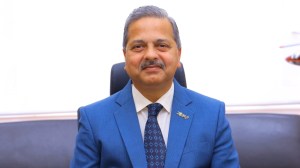Stay updated with the latest - Click here to follow us on Instagram
Return Ticket: My Mother’s Daughter
Suchitra Sen plays her twin roles in Mamta with equal panache.
 Mamta (1966)
Mamta (1966)
Can you love someone so much that you suffer every indignity just so she has a chance at a better life? Can you go to any extent to protect your most cherished person? Do you have what it takes to fight the world, to break all societal norms, just to see a smile on someone’s face? Yes, perhaps, if you are a mother. Who else can love so selflessly and deeply? Who else can be so devoted and unconditional?
Asit Sen’s Mamta is a portrayal of the epitome of a mother’s love for her child. Spearheaded by Suchitra Sen in a double role — that of a courtesan and a feisty lawyer — the film works as a love story at two levels.
It’s about star-crossed lovers — the wealthy barrister Monish Roy (Ashok Kumar) and Devyani (Sen), who belongs to a poor family. They share an extraordinary love but destiny plays truant, and Monish has to go abroad for further studies and a series of misfortunes befall Devyani, who ends up getting married to the alcoholic, gambler and womaniser Rakhal (Kalipada Chakraborty). Rakhal pimps his wife to other men. Devyani runs away, even tries to commit suicide, but is saved by a kothewali, who gives her a new chance at life as the courtesan Panna Bai.
At its core, Mamta is a love story of a mother and child. Devyani gives birth to a baby girl and dedicates her life to save her daughter from her evil father. Destiny once again reconnects her with Monish and she requests him to take care of Suparna (also Suchitra Sen) as she is fearful that she won’t be able to protect her. The mother lets go of her child, preferring to watch her from the shadows. She devours every little detail which Monish shares with her, but doesn’t appear in front of her. As Monish tells her, “Kaisi anokhi puja hai tumhari”, Devyani replies, “Ab toh isi mein mann lagta hai.”
Mamta was the Hindi remake of Bengali film Uttar Falguni, also starring Sen. Just like in the original, she brings her brand of gravitas to Mamta and comes up with an accomplished performance. She is equally at ease dancing to thumris as she is holding the gun to shoot Rakhal. As young Suparna, she shares a playful chemistry with Dharmendra, but one gets a sense that the dashing hero was awed by her. In an interview, Dharmendra said so. During the shoot of the song In baharon mein akele in Darjeeling — which was shot in a single take — the actor was finding it tough to keep pace with Sen. “I had to kneel down and hold her arms softly. I was finding it difficult to keep pace with her lip syncing and expressions. But when she realised my difficulty, she helped me build my confidence,” Dharmendra also in the interview.
He also said that Sen complimented him for his work in Mamta and had an affectionate pet name for him. “She used to call me D,” he said.
With Ashok Kumar, the romance was at another level. Who can forget Rahen na rahen hum? Majrooh Sultanpuri’s words
serve as the haunting theme of the film. The incompleteness and melancholy of unfulfilled love comes across beautifully in the song. Lata Mangeshkar has gone on record to say that it is one of her favourite songs. Sultanpuri’s son Andalib had said that a few years ago, when she was to launch her perfume, Lataji had asked Majrooh saab if she could use Rahen na rahen hum as the tagline.
The tune of the song is deeply inspired by SD Burman’s Thandi hawaayein from 1951’s Naujawan, a fact Roshan didn’t deny since he loved Dada Burman’s composition. Mamta’s soundtrack has another gem — Chhupa lo yun dil mein pyar mera — rendered magnificently by Hemant Kumar and Lata. I also love the largely underrated Lata number Rehte they kabhi. Devyani sings this song as the courtesan Panna Bai — which makes Monish so uncomfortable that he listens to her from behind a curtain. The dialogue that follows the song — “Ja kar keh dijiye unse ki agar zindagi ko jaan-na chahte hain toh parde ke peeche na rahen… samne aake uska muqabla karen” — is Devyani’s knockout punch.
Mamta culminates in a courtroom drama when Devyani is charged with Rakhal’s murder and Suparna has no mercy for her, until she comes to know the truth. The roles are reversed in the final argument, when it’s the daughter who fights to restore her mother’s dignity, as she declares to the world, “Mamta ki itni muqadas misaal duniya mein bahut kam milti hai… Main bade fakr aur guroor se apni maa ki beti hona sweekar karti hoon.”







